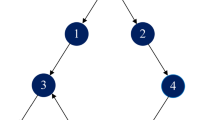Abstract
In this paper, the multi-agent formation problem of networked nonlinear multi-agent systems with local Lipschitz continuous dynamics under directed interaction topology, is investigated. Based on the nonlinear dynamics satisfying locally Lipschitz continuous conditions, three kinds of sliding mode controllers are proposed to solve the problem of multi-agent formation control. Using integral sliding mode controller in first-order system, formation shape is achieved within finite time. For second-order system, on the one hand, non-singular terminal sliding mode function is adopted to accomplish the system asymptotic convergence. Furthermore, super-twisting algorithm is proposed to make multi-agent achieve the desired formation within finite time. Lyapunov functions are applied in the whole paper to ensure the system stability. Numerical simulation examples are provided to demonstrate the effectiveness of the proposed sliding mode control methods.
Similar content being viewed by others
References
Yin S, Yang H, and Kaynak O, Coordination task triggered formation control algorithm for multiple marine vessels, IEEE Transactions on Industrial Electronics, 2017, 64(6): 4984–4993.
Bai J, Wen G, Rahmani A, et al., Distributed formation control of fractional-order multi-agent systems with absolute damping and communication delay, International Journal of Control Automation & Systems, 2017, 15(1): 85–94.
Shojaei K, Output-feedback formation control of wheeled mobile robots with actuators saturation compensation, Nonlinear Dynamics, 2017, 89(6): 1–12.
Nasir M T and El-Ferik S, Adaptive sliding-mode cluster space control of a non-holonomic multirobot system with applications, IET Control Theory & Applications, 2017, 11(8): 1264–1273.
Chang Y H, Chang C W, Chen C L, et al., Fuzzy sliding-mode formation control for multirobot systems: Design and implementation, IEEE Transactions on Systems Man & Cybernetics Part B: Cybernetics, 2012, 42(2): 444–457.
Xie W, Ma B, Fernando T, et al., A new formation control of multiple underactuated surface vessels, International Journal of Control, 2017, 91(10): 1–12.
Franceschelli M, Pisano A, Giua A, et al., Finite-time consensus with disturbance rejection by discontinuous local interactions in directed graphs, IEEE Transactions on Automatic Control, 2015, 60(4): 1133–1138.
Zhao L, Jia Y, and Yu J, Adaptive finite-time bipartite consensus for second-order multi-agent systems with antagonistic interactions, Systems & Control Letters, 2017, 102: 22–31.
Kulkarni A, Kazi F, and Singh N, Multiagent synchronization under delay in position and velocity with application to formation control, IEEE International Conference on Advances in Computing, Communications and Informatics, 2013, 1981–1986.
Yu W, Chen G, Cao M, et al., Second-order consensus for multiagent systems with directed topologies and nonlinear dynamics, IEEE Transactions on Systems Man & Cybernetics Part B: Cybernetics, 2010, 40(3): 881–891.
Chang Y H, Yang C Y, ChanWS, et al., Leader-following formation control of multi-robot systems with adaptive fuzzy terminal sliding-mode controller, IEEE International Conference on System Science and Engineering, July 4–6, Budapest, Hungary. 2013, 45–50.
Wang X, Qin J, Xun L, et al., Formation tracking for nonlinear agents with unknown second-order locally Lipschitz continuous dynamics, Proceedings of the 31st Chinese Control Conference, July 25–27, Hefei, China, 2012, 6112–6117.
Hui Q, Finite-time rendezvous algorithms for mobile autonomous agents, IEEE Transactions on Automatic Control, 2011, 56(1): 207–211.
Li P, Ma J, Zheng Z, et al., Fast non-singular integral terminal sliding mode control for nonlinear dynamical systems, The 53rd IEEE Conference on Decision and Control, December 15–17, LosAngeles, California, USA, 2014, 4739–4746.
Feng Y, Yu X, and Man Z, Non-singular terminal sliding mode control and its application for robot manipulators, IEEE International Symposium on Circuits & Systems, 2002, 3(2): 545–548.
Cao Y, Ren W, and Meng Z, Decentralized finite-time sliding mode estimators and their applications in decentralized finite-time formation tracking, Systems & Control Letters, 2010, 59(9): 522–529.
Liao Q, Wang C, and Mei Y, Sliding mode control for multi-robot formation, IEEE Conference on Robotics, Automation & Mechatronics, September 21–24, Chengdu, China, 2008, 395–398.
Tournes C and Shtessel Y, Automatic docking using second order sliding mode control, Proceedings of the American Control Conference, New York City, USA, July 11–13, 2007, 3855–3860.
Ding S and Zheng W X, New design method of sliding mode controller for a class of nonlinear second-order systems, International Symposium on Circuits and Systems (ISCAS), IEEE, 2014, 2784–2787.
Ren C and Chen C L P, Sliding mode leader-following consensus controllers for second-order nonlinear multi-agent systems, IET Control Theory & Applications, 2015, 9(10): 1544–1552.
Kitudomrat N, Khoo S, and Xie L, Integral terminal sliding mode control approach for multirobot formation, IEEE International Conference on Control and Automation, Christchurch, New Zealand, December 9–11, 2009, 98–103.
Lahire V S, Chandle J O, Dhaigude V D, et al., Finite time consensus for leader following multiagent system with distributed observer design, IEEE 4th ICCCNT, Tiruchengode, India, July 4–6, 2013, 1–6.
Defoort M, Floquet T, Kokosy A, et al., Sliding-mode formation control for cooperative autonomous mobile robots, IEEE Transactions on Industrial Electronics, 2008, 55(11): 3944–3953.
Shahrivar E and Sundaram S, The strategic formation of multi-layer networks, IEEE Transactions on Network Science & Engineering, 2015, 2(4): 164–178.
Ashrafiuon H, Muske K R, Mcninch L C, et al., Sliding-mode tracking control of surface vessels, IEEE Transactions on Industrial Electronics, 2008, 55(11): 4004–4012.
Author information
Authors and Affiliations
Corresponding author
Additional information
This work is supported in part by the National Natural Science Foundation of China under Grant Nos. 61375105 and 61403334, Chinese Postdoctoral Science Fundation under Grant No. 2015M581318.
This paper was recommended for publication by Editor LIU Guoping.
Rights and permissions
About this article
Cite this article
Wang, J., Luo, X., Li, X. et al. Sliding Mode Formation Control of Nonlinear Multi-agent Systems with Local Lipschitz Continuous Dynamics. J Syst Sci Complex 32, 759–777 (2019). https://doi.org/10.1007/s11424-018-7299-1
Received:
Revised:
Published:
Issue Date:
DOI: https://doi.org/10.1007/s11424-018-7299-1



